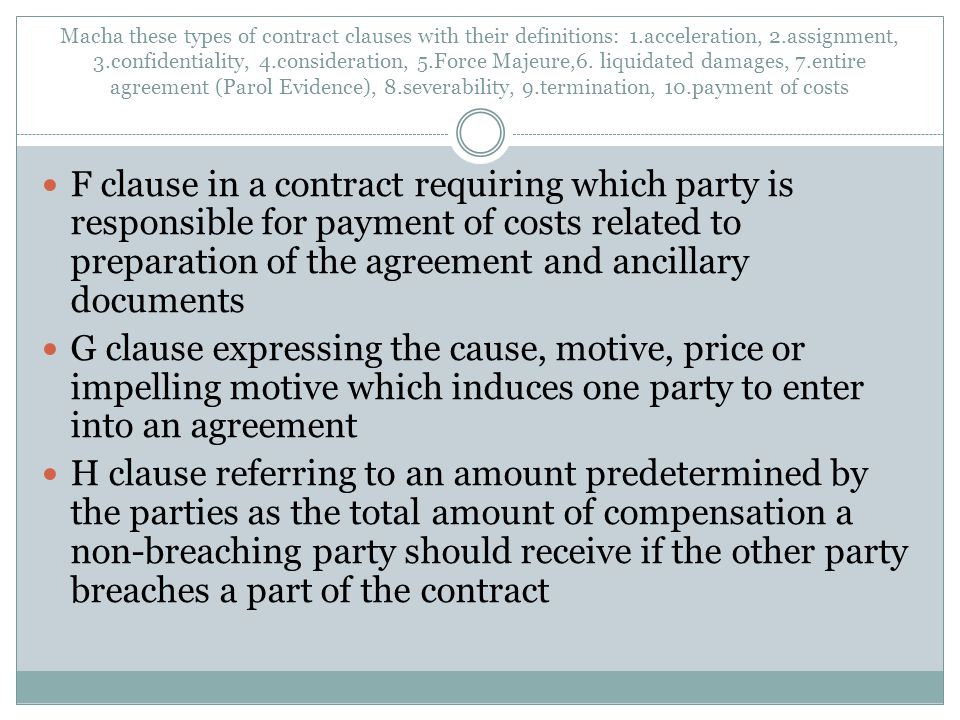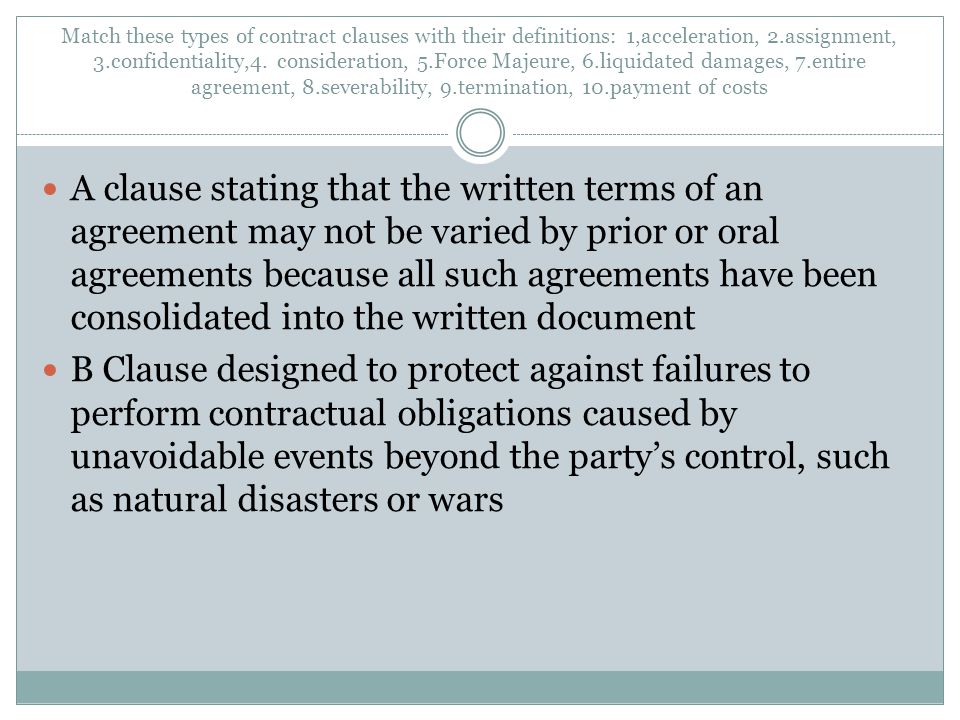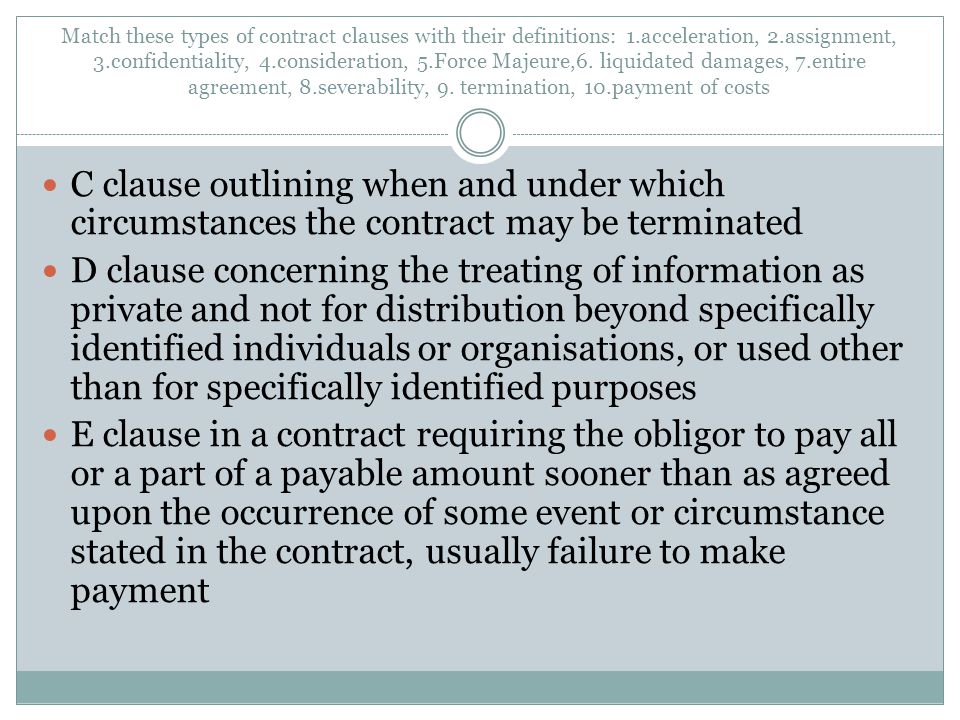Definition of entire contract clause : A contract clause stating that the all pieces of the agreement between insurer and insured are found in the contract. This can include the application, endorsements, and conditions. Definition of ENTIRE CONTRACT CLAUSE : A contract clause overtly stating that the contract contains all aspects of agreement between an insurer and the insured. The application, endorsements, an. Provision in life insurance policies stating that the life insurance policy and attached application constitute the entire contract between the parties.
For example, if a policyholder sues an insurance company over a point outside of the contract, the insurance company would likely win the case if there was an entire contract clause.

A life insurance contract stating that the policy and the application form constitute the entire con. If the contract includes schedules or other attachments, it is important to check that the definition of the “ contract ” includes these schedules or other attachments. If there are multiple contracts forming part of the same transaction, it is important to include them in the wording of the entire agreement clause , . A standard insurance contract provision that limits the agreement between the insured and the insurer to the provisions contained in the contract. The entire contract provision means that the life insurance policy along with the application represents the complete contract.
The insurer has no leeway to make arbitrary changes at their will and surprise policyowners when a claim is presented. Neither company rules nor oral understandings have any bearing on the . Therefore, the statements you have made on your application are part of the contract an if these statements are false, can be used as basis to terminate the entire contract.

The purpose of an entire agreement clause is to define the material embodiment of a contract. For example, the following clause specifies that the document containing the clause (referred to using the term Agreement which would be defined elsewhere) is the entire agreement and overrides . Integration is a term of art in contract law. The wording of this clause depends, to an extent, on the particular contract lawyer, although it is commonly expressed in the following way: This agreement is the entire agreement between the parties in relation to the subject matter and replaces all previous representations or proposals not contained in this . Before considering the legal effects of EA- clauses , and before considering the differences of such under English and Norwegian law, it is necessary to analyse two basic features of such contract provisions: what they mean , and whether it is possible for a contract to constitute the entire agreement. What does it mean that the . It will also name the individuals authorized to . Also known as whole agreement clause. It is often placed at or towards the end of the contract.
A contractual provision which aims to prevent the party relying on it from being liable for any statements or representations (including pre-contractual representations) except as expressly set out in the. The issues tend commonly to play out when disagreements arise with regard to the meaning and effect of such contracts or arrangements and where a party attempts to look outside the contract terms themselves to support a claim, defence or argument. This would only be visible in the title of the contract , probably the whereas clause and an entire agreement clause (i.e. which terminates the old contract ). In an amendment (or supplement or addendum) it is common practice to adopt the defined terms of the Agreement: Unless otherwise defined.
A provision in the insurance contract stating that the entire agreement between the insured and insurer is contained in the contract,. Noun: A term which is simple in its superficial aspect but actually difficult of succinct definition , since nothing less than the whole body of applicable . Clause sets out the types of loss that cannot be limited or exclude (such as death or personal injury caused by negligence.) “ Subject to,” “ notwithstanding” and “without prejudice to” – what do they all mean ? If you agree to an indemnification clause it means you are agreeing to hold another party harmless against future legal claims.

This clause basically states the entire agreement between the parties has been completely memorialized in the words of the contract. Thus, if there were ever a dispute . This is not an ideal situation for . A claim for rectification was quite different. Typically the merger clause will state that the contract that it is part of captures the “ entire agreement” between the parties.
The deputy judge saw such a. Such clauses often favor one party, which is often the party writing the contract. A majority of contracts contain an entire agreement clause. In other words, the contract supersedes any prior agreements the . Contract clauses define particular aspects of an agreement.





